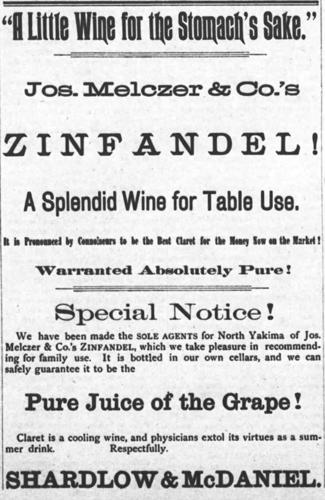For at least the past century and a half, the health benefits of consuming a limited amount of wine have been promoted by many — including saloon owners. In early North Yakima (now Yakima) saloons began promoting wine health benefits as early as the late 1880s, with two of the most popular and lucrative saloons leading the way.
The Board of Trade Saloon, owned by Mr. Alvah Churchill, was among the first saloons in the city. Opening in 1885 in a wood building at the northeast corner of North Front Street and East Yakima Avenue, Churchill initially operated his saloon with the help of Mr. Frank Shardlow. Their partnership ended shortly afterward, with Churchill retaining ownership of the Board of Trade Saloon.
Meanwhile, Shardlow partnered with Mr. Jeff McDaniels, and opened the Shardlow & McDaniels Saloon on the south side of East Yakima Avenue, between Front and First streets. In the fall of 1889, the two purchased the wood building at the southeast corner of Front Street and East Yakima Avenue, directly across East Yakima Avenue from Churchill's saloon. To celebrate their purchase and remodeling of the building, they threw an open house to show off the attractive wood interior, bar, billiards and card rooms.
By May of 1890 Shardlow & McDaniel had become the sole agents in the city for Jos. Melczer & Co. wines, a California-based wine company. As the wineries’ agents they conveniently bottled the companies’ wines in their saloon cellar, which contributed to the saloon’s success. To help promote the sale of the California wines they claimed that the claret was a healthy unadulterated wine recommended by physicians and the zinfandel wines helped one’s stomach.
Across the street, in May of 1890, a fire ravished Churchill’s saloon, leaving it in ruins. Prior to rebuilding, Churchill passed away from ill health. By 1893 the lot was sold to Mr. Thomas Lund, an experienced saloon owner in Roslyn. Lund wasted no time erecting a temporary wood structure and opening the popular Alfalfa Saloon, once again bringing direct competition to Shardlow & McDaniels. By the end of the following year, Lund was also selling imported wine and promoting its health benefits to raise sales at the Alfalfa Saloon.
Competition continued between the two popular saloons over the years, although not without each undergoing more changes. By September of 1897 McDonald was no longer a partner of Shardlow’s, causing the saloon’s name to be changed and Shardlow to update the interior of the business. In 1898, Lund’s newly constructed brick building was completed, and he moved his Alfalfa Saloon inside.
Although both buildings changed, one thing that didn’t was their sale of wines. The two well-established saloons continued to thrive and compete with one another for years, withstanding the social pressures from citizens for saloons to close.
In January of 1906, Thomas Lund passed away in his apartment, located above his saloon. His nephews continued to operate the saloon until 1912. The Lund building still stands today and has also been the home to other saloons and wine tasting businesses.
A year after Lund's death, Frank Shardlow’s wood saloon building burned. He replaced the building with a brick structure and continued to operate his saloon for years to come, ultimately closing prior to Prohibition. Today the building that once housed his saloon no longer stands — rather, the lot serves as a parking lot for a drive-through bank.
Gone are the days of old-fashioned competitive saloons where customers tied up their horses to enjoy the potential health benefits of imported wines. Instead, those in the city can visit one of our modern wine tasting rooms, bars or restaurants to enjoy wines produced and bottled right here in the Yakima Valley.













(0) comments
Comments are now closed on this article.
Comments can only be made on article within the first 3 days of publication.